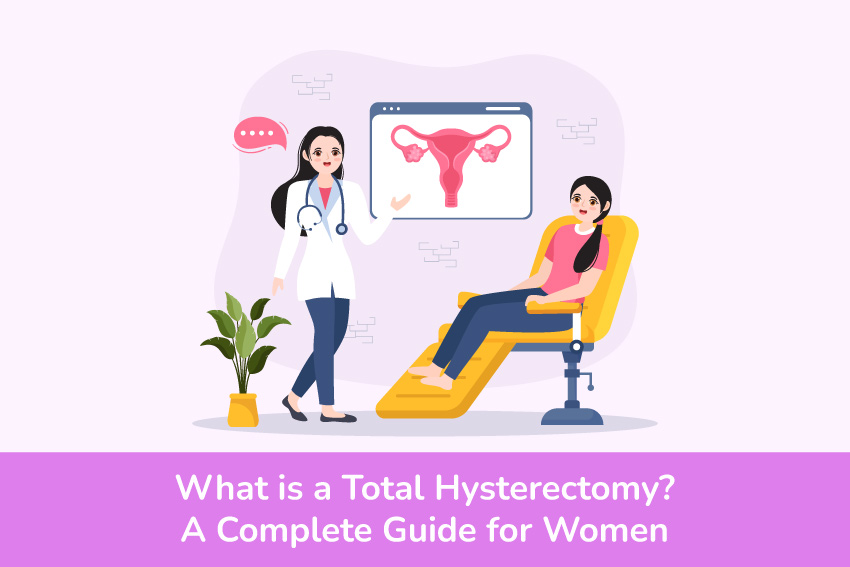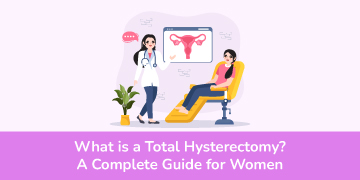
A total hysterectomy is a surgical treatment that entails the elimination of the uterus and the cervix. It is usually advised when women are subjected to chronic or severe gynaecological diseases like uterine fibroids, endometriosis, abnormal bleeding, chronic pelvic pain, or uterine and cervical cancer. It provides sustainable relief in cases when other forms of treatment have not helped.
Although a total hysterectomy may seem like a big concern, the process of undergoing such surgery can be made easier by learning the specifics about how it is done, what to expect after the surgery, and how this procedure will affect its patients in the long run.
This guide will take you step-by-step through everything you need to know about the practice of hysterectomy surgery for women, including its types, preparation, and recovery, as well as the emotional and long-term effects it has on a person, and thus provide you with knowledge that will help you make confident healthcare decisions.
A] Types of Total Hysterectomy?
Total hysterectomy involves the removal of the uterus and cervix, but the approach and extent of the procedure can vary. The most common types include abdominal hysterectomy, where the uterus is removed through an incision in the abdomen, and vaginal hysterectomy, which is performed through the vaginal canal without external cuts. Minimally invasive methods like laparoscopic hysterectomy and robot-assisted hysterectomy are also popular for their quicker recovery times and reduced scarring.
In some cases, the fallopian tubes and ovaries are also removed, known as a total hysterectomy with salpingo-oophorectomy. Each method has specific benefits and is chosen based on the patient’s medical condition and personal preferences.
Take the first step toward better women’s health today.
B] Who Typically Needs This Surgery?
Hysterectomy surgery for women is typically recommended when other treatments have failed to manage serious gynecological conditions. Common reasons include uterine fibroids, endometriosis, chronic pelvic pain, heavy or abnormal bleeding, and certain types of cancer, such as cervical or uterine cancer. It is generally considered a last resort after non-surgical methods prove ineffective.
A gynecologist or oncologist may suggest this procedure based on the severity of the condition, overall health, and patient preferences. Total hysterectomy is a significant decision, often aimed at improving quality of life or preventing the progression of a life-threatening disease.
C] How to Prepare for Surgery?
Preparing for a total hysterectomy procedure involves both physical and mental readiness. Begin with a pre-surgery checklist: undergo recommended tests, arrange for post-operative care, and stop certain medications if advised. Pack essentials like loose clothing, hygiene products, and ID documents for the hospital stay.
Discuss potential risks, type of anesthesia, and recovery expectations with your doctor. It’s also helpful to ask about what to expect after a complete hysterectomy, including pain management and mobility. Hysterectomy surgery for women can feel overwhelming, but thorough preparation helps reduce anxiety and ensures a smoother surgical and recovery experience.
D] What to Expect in The Procedure?
The total hysterectomy procedure usually takes 1 to 3 hours, depending on the surgical method used. It can be performed through different approaches—laparoscopic (minimally invasive), abdominal (open surgery), or vaginal. On the day of surgery, you’ll receive general anesthesia. The surgeon will remove the uterus and cervix, and possibly the ovaries and fallopian tubes, based on your condition. Laparoscopic and vaginal procedures typically require a shorter hospital stay—about 1 to 2 days—while abdominal surgeries may need up to 3 to 4 days. Knowing these steps can help reduce anxiety and prepare you for a smoother experience.
E] Recovery Timeline & Emotional Healing After a Total Hysterectomy
Recovery after a complete hysterectomy varies but generally follows a gradual path over 6–8 weeks. In Week 1, rest is crucial as you manage immediate post-op symptoms like fatigue and soreness. By Week 2–3, you may begin gentle movements and controlled pain management. Week 4–6 often bring a return to light activities, while Week 6+ marks a gradual return to normalcy and follow-up care.
Watch for signs like fever, heavy bleeding, or severe pain, and contact your doctor if they occur. Alongside physical healing, hysterectomy surgery for women may bring emotional challenges, especially if the ovaries are removed, causing hormonal shifts. Concerns about body image or sexual health are common.
Seeking emotional support or therapy can be helpful, offering space to navigate these changes. Open communication with your doctor and loved ones is key to a smooth, supported recovery journey.
F] What Will be the Long-Term Effects of a Total Hysterectomy?
The long-term effects of a complete hysterectomy can differ from woman to woman. If the ovaries are removed during surgery, a procedure known as oophorectomy, menopause begins immediately, often causing symptoms like hot flashes, mood swings, and vaginal dryness. However, if the ovaries are left intact, hormone production continues, and menopause occurs naturally over time.
Other possible effects include changes in sexual desire, emotional shifts, and slight weight gain. These can usually be managed with healthy lifestyle adjustments and emotional support. Total hysterectomy recovery also includes mental well-being, so counselling or support groups can be beneficial for managing long-term emotional and physical changes.
G] Tips for a Smooth Recovery
A smooth total hysterectomy recovery begins with giving your body the time it needs to heal. Prioritise rest in the early weeks and avoid activities like heavy lifting or intense exercise. Staying hydrated and eating nutrient-rich foods such as leafy greens, lean proteins, and fruits can promote faster healing. Gentle walking, even for a few minutes each day, improves circulation and helps prevent complications like blood clots.
It’s also essential to listen to your body, don’t push through pain or fatigue. Keep up with follow-up appointments and check-ins with your gynecologist to monitor your recovery and address any concerns. With patience, care, and healthy habits, you can support your physical and emotional well-being throughout the healing process.
Looking for a Private Gynaecologist in London?
H] Final Thoughts
Recovery after a total hysterectomy is entirely manageable with the right care, guidance, and emotional support. Every woman’s journey is unique, so following post-operative instructions and seeking personalised medical advice is essential for a smooth healing process. Don’t hesitate to reach out to professionals who understand your needs and can provide compassionate, expert care.
If you’re looking for trusted advice or a consultation, consider speaking with Women’s Healthcare, a private gynaecologist in London. Our team is here to support you every step of the way, from surgery to recovery and beyond.

Neha Goel
Neha Goel, a Psychology alumna and MBA graduate from CASS Business School, London, brings together her expertise as a Reiki Practitioner and Practice Manager. She integrates psychology and business strategies to foster holistic well-being and personal development.

